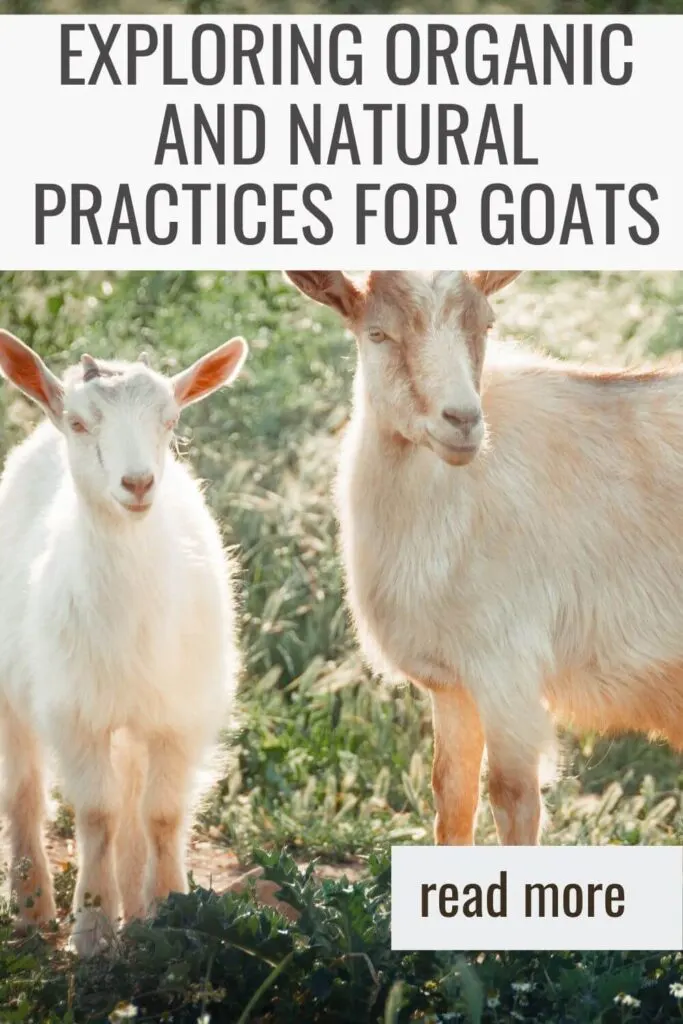Nurturing Goats in Harmony with Nature: Exploring Organic and Natural Practices
As the demand for sustainable and ethically produced food continues to grow, many individuals are exploring the possibility of raising goats organically and naturally. The question arises: Is it feasible to raise goats without the use of synthetic chemicals and conventional farming methods? In this article, we will delve into the principles of organic and natural goat farming, exploring the challenges, benefits, and key practices involved in nurturing goats in harmony with nature.
Understanding Organic Goat Farming:
- Feed and Forage:
- Organic Feed: In organic goat farming, the emphasis is on providing goats with certified organic feed that is free from synthetic pesticides, herbicides, and genetically modified organisms (GMOs).
- Pasture Management: Organic goat farming often involves rotational grazing and sustainable pasture management, allowing goats to graze on diverse and naturally occurring vegetation.
- If there isn’t enough land to support the goats, they will have to be kept in a dry lot and feed lot situation where they are fed hay. They need more than just grass hay though. They will need full and constant access to minerals and clean water. In such a situation, their pens and barn area need to be kept very clean to avoid sickness and worms. And they still need the ability to exercise in some way everyday.
- Healthcare Practices:
- Herbal Remedies: Organic goat farmers may turn to herbal remedies and natural supplements to maintain the health of their herd. This includes using herbs with known medicinal properties to address common health issues.
- Preventive Measures: Organic farming places a strong emphasis on preventive healthcare, such as regular health checks, proper nutrition, and a clean living environment.
Challenges of Organic Goat Farming:
- Certification Requirements:
- Achieving organic certification can be a lengthy and rigorous process, requiring adherence to specific standards and documentation. This process ensures that the farming practices align with organic principles.
- Parasite Management:
- Managing internal and external parasites without synthetic chemical interventions can be challenging. Organic farmers often rely on strategic rotational grazing, herbal dewormers, and other natural methods.
- If you use herbal parasite treatments, and have a serious parasite outbreak, be willing to use chemical dewormers to keep your goats healthy.
- Know and understand that parasite are the leading killer in goats. You can’t allow this to become a problem in your herd or it will get out of hand.
Natural Goat Farming Practices:
- Holistic Approach:
- Holistic Management: Natural goat farming emphasizes a holistic approach to animal husbandry. This includes considering the overall well-being of the goat, the health of the soil, and the sustainability of the farm ecosystem.
- Become very informed about holistic management before you dive into using them. Buy books about herbs and learn how to make tinctures. Study what is effective in goats and how much it takes to be effective. Immerse yourself in learning about this approach so that it actually is effective in your goat herd and doesn’t become one of the statistics of it not working because of improper use.
- Minimizing Human Intervention:
- Natural Breeding Practices: You may go so far as to try to minimize as much human interaction as possible. Some natural goat farmers opt for natural breeding practices, allowing goats to breed without artificial insemination. This aligns with the natural instincts of the animals.
Benefits of Organic and Natural Goat Farming:
- Environmental Stewardship:
- Sustainable Practices: Organic and natural goat farming often incorporates sustainable practices, contributing to soil health, biodiversity, and reduced environmental impact.
- Healthier Products:
- Nutrient-Rich Products: Goats raised organically and naturally may produce milk and meat with a higher nutritional quality, as they graze on diverse and natural forage.
Keep Excellent Records
It’s really important to be a diligent and proficient record keeper. And it’s easy to do with My Goat Binder and My Parasite Control Plan:
Conclusion: Striking a Balance between Nature and Nurturing:
Raising goats organically and naturally is indeed possible, with many farmers successfully adopting practices that align with these principles. While challenges such as certification requirements and parasite management exist, the benefits of sustainable and ethical goat farming make the effort worthwhile. Organic and natural goat farming isn’t just a method; it’s a philosophy that harmonizes with nature, promotes animal welfare, and produces high-quality, environmentally responsible products. Whether you are a seasoned farmer or a newcomer to goat husbandry, exploring and embracing organic and natural practices can lead to a fulfilling and sustainable journey in goat farming.
There’s a lot more to know about raising goats: Raising Goats Resource Page
